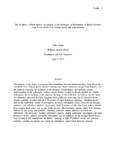The Evolution of Redemption: An Analysis of the Ideologies of Redemption of Rabbi Abraham, Isaac Kokk, Rabbi Tzvi, Yehuda Kook, and Gush Emunim (thesis)

View/
Author
Yadlin, Shiri
Subject
Washington and Lee University -- Honors in Religion
Kook, Zevi Judah ben Abraham Isaac, ha-Kohen, 1891-1982
Gush emunim (Israel)
HIstory
West Bank
Politics and government
Jewish-Arab relations
Religious Zionism -- Israel
Metadata
Show full item recordDescription
Thesis; [FULL-TEXT FREELY AVAILABLE ONLINE] Shiri Yadlin is a member of the Class of 2012 of Washington and Lee University. The purpose of this paper is to explore the relationship between Rabbi Abraham Isaac Kook, his son Rabbi Tzvi Yehuda Kook, and the contemporary Israeli settlement group Gush Emunim, for the purpose of tracing the evolution of the ideology of redemption and attaining a better understanding of the philosophy of these Israeli settlers. Central to Jewish thought as a whole, redemption lies at the heart of the religious ideology of the settlement movement, but the vision of redemption preached by Gush Emunim takes a different form than that of Abraham Kook, despite scholarly assertion that he is the source of Gush Emunim's ideology. Abraham Kook follows the kabbalistic model of redemption, in which redemption comes about slowly through penitence and individual religious observance. Gush Emunim, on the other hand, believe humans have a much more active role to play in the process. The restorative model, which their ideology follows, is also active and assertive, requiring collective human initiative to ensure its fulfillment. The disconnect between Abraham's passive, patient kabbalistic redemption and Gush Emunim's active, militant restorative redemption can be explained by the younger Rabbi Kook. Tzvi Yehuda Kook reinterpreted his father's message in light of political events and personal ambition, creating an entirely new vision of redemption, which Gush Emunim adopted.